Diverticulitis: 10 Home Remedies And Natural Treatments
Effective and easy-to-try solutions to manage the symptoms and discomfort caused by the condition.
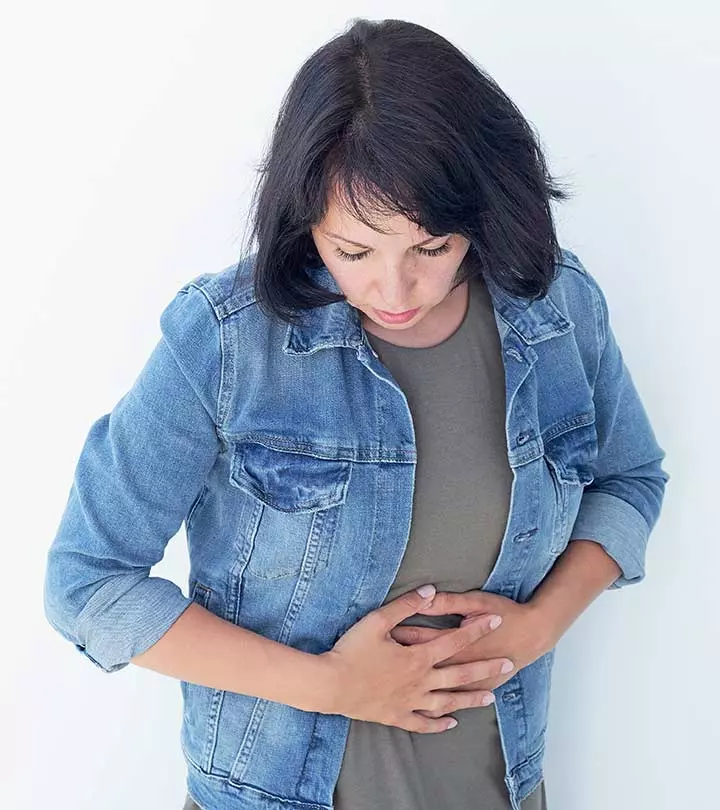
Image: Shutterstock
Diverticular diseases have seen a sheer increase in the number of cases over the last century. Recent studies indicate that 50% of people older than 60 years are affected by diverticular diseases with 10%- 25% developing diverticulitis (1). Diverticulitis develops due to the formation of infectious pouches on the colon which is associated with extreme discomfort and requires immediate medical intervention. In this article, we take a look at what diverticulitis is and the treatment options available.
In This Article
What Is Diverticulitis?
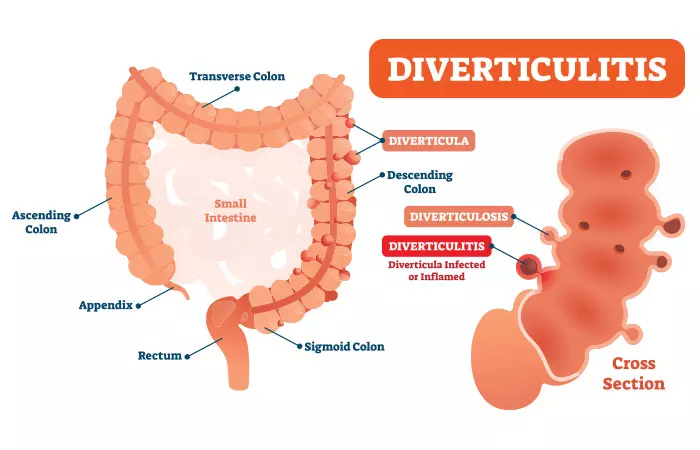
Diverticulitis is associated with the formation of diverticula, which are pouch-shaped formations that occur along your digestive tract. Diverticula most often occur in the colon, i.e., the large intestine.
These pouches are a result of weak spots in the intestinal walls that tend to blow outward. The pouches (diverticula) can become inflamed or infected by bacteria, thus causing diverticulitis.
Diverticula are harmless unless they are inflamed or infected. If you have developed diverticula that are not infected or inflamed, the condition is known as diverticulosis.
Let’s take a quick look a the major differences between diverticulitis and diverticulosis.
Diverticulitis Vs. Diverticulosis
Diverticulitis
- It is associated with the formation of pouches called diverticula that become inflamed or infected.
- There is a chance of recurrence.
- Diverticulitis can also turn chronic in some people.
- The risk of developing diverticulitis increases with age.
Diverticulosis
- Diverticulosis is associated with the formation of pouches called diverticula that are not infected or inflamed.
- It usually doesn’t exhibit any symptoms, and if the condition actually does cause symptoms, it is referred to as symptomatic uncomplicated diverticular disease (SUDD).
- In rare cases, diverticulosis can result in the development of diverticulitis.
- As in the cases of diverticulitis, the risk of developing diverticulosis increases with age.
Unlike diverticulosis, diverticulitis can cause mild to severe symptoms that can occur all of a sudden or gradually over a few days.
Signs And Symptoms
The common signs and symptoms associated with diverticulitis are:
- Abdominal pain that typically occurs in the lower left side
- Nausea
- Vomiting
- Fever
- Increased urinary frequency
- Diarrhea
- Constipation
- Blood in the stool
Diverticulitis is caused by a combination of factors that are discussed below.
Causes And Risk Factors
The root cause of diverticulitis is the blockage of the opening diverticula.
This blockage is usually triggered by the accumulation of fecal matter that leads to inflammation and subsequent infections.
Other factors associated with an increased risk of diverticulitis are:
- A diet low in fiber
- Heredity: A family history of the condition
- A sedentary lifestyle
- Obesity
- Smoking
- Regular use of certain nonsteroidal anti-inflammatory medications like aspirin
- A deficiency in vitamin D
- Sex: In those aged 50 or younger, diverticulitis is more common in men, whereas, in those aged above 50, it is more common in women.
- Advancing age
Since the symptoms of diverticulitis are similar to those of many other health conditions, your doctor may need to carry out one or more of the following tests to diagnose your condition.
How Is Diverticulitis Diagnosed?
You may be asked about your symptoms, medical history, and the medicines you are on. Other diagnostic tests may include:
- A physical exam to check the abdomen for tenderness
- A digital rectal exam to look for symptoms of pain, bleeding, masses, or other problems
Other diagnostic tests that may need to be carried out include:
- Blood tests to look for inflammation, anemiai A medical condition characterized by a lack of sufficient healthy red blood cells in the body. , or other medical conditions like kidney or liver problems
- Imaging tests like an abdominal ultrasound or CT scan
- Urine test to look for different types of infections
- Stool test to check GI infectionsi Bacterial, viral, or parasitic infections that cause inflammation in the intestines or the stomach.
- Pelvic examination to rule out gynecological problems
- Women may have to take a pregnancy test to rule out pregnancy
Once your condition is diagnosed, your doctor may prescribe treatments depending on the severity of the symptoms.
Treatments For Diverticulitis
The treatment options for diverticulitis may include:
- A clear liquid diet
- A low-fiber diet
- Medications for diverticulitis including antibiotics like Metronidazole, Ciprofloxacin, or Amoxicillin
- Follow-up medical appointment to check if your symptoms have improved
- Surgery for severe cases of diverticulitis
Even after undergoing surgery, you might see a recurrence of this disorder.
A study that examined the occurrence of recurrent diverticulitis following sigmoid colectomy for diverticular disease showed that out of 1,356 patients, 10 individuals (1.1%) experienced a recurrence of diverticulitis. The incidence of diverticulitis recurrence was observed as follows: at 1 year, 0.37%; at 5 years, 1.07%; at 10 years, 2.14%; and at 15 years, it remained at 2.14%.
Management of the symptoms of diverticulitis can be done right at home in the initial stages. However, in rare cases, it can lead to complications, and those suffering from acute cases may need to be admitted to a hospital for treatment.
You are wondering, “how to relieve diverticulitis pain fast and naturally?” The home remedies that can help in managing the symptoms of diverticulitis are listed below.
How To Manage The Symptoms Of Diverticulitis Naturally
- Slippery Elm
- Aloe Vera Juice
- Vitamin D
- Licorice Root
- Grapefruit Seed Extract
- Ginger
- Garlic
- Turmeric
- Apple Cider Vinegar
- Acupuncture
Home Remedies To Ease The Pain Of Diverticulitis
1. Slippery Elm
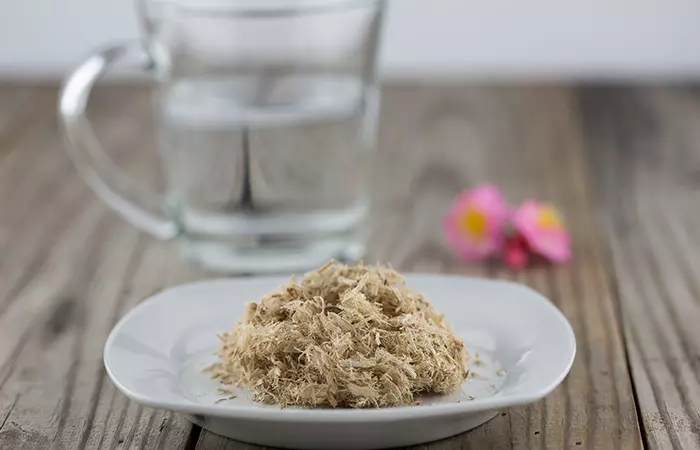
You Will Need
- 2 teaspoons of slippery elm
- 1 glass of water, fruit juice, or tea
What You Have To Do
- Add one to two teaspoons of slippery elm to a glass of water, fruit juice, or tea.
- Mix well and drink up.
How Often You Should Do This
You can drink this mixture 1 to 2 times per day.
Why This Works
Slippery elm has demulcent properties that can help in relieving inflammation of the diverticula in your intestine (2).
Caution
Take your doctor’s advice before consuming this.
 Quick Tip
Quick Tip2. Aloe Vera Juice
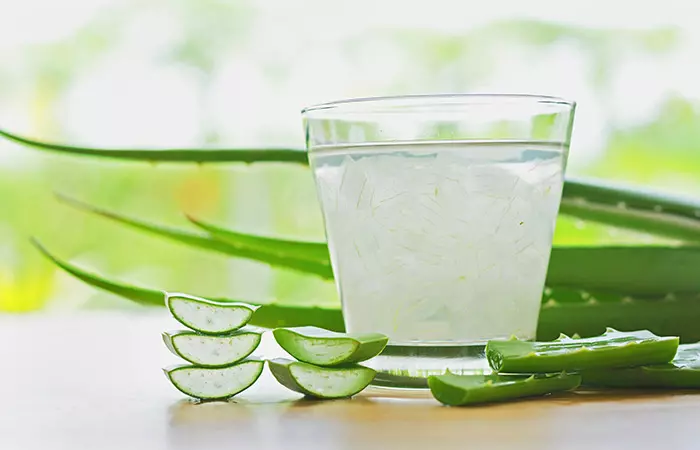
You Will Need
1-2 tablespoons of fresh aloe vera juice
What You Have To Do
Drink one to two tablespoons of fresh aloe vera juice daily.
How Often You Should Do This
Make sure you drink it only once daily.
Why This Works
Aloe vera is used to treat various health conditions due to its healing and anti-inflammatory properties (3). These properties can help in soothing the inflamed and irritated diverticula along the digestive tract.
3. Vitamin D
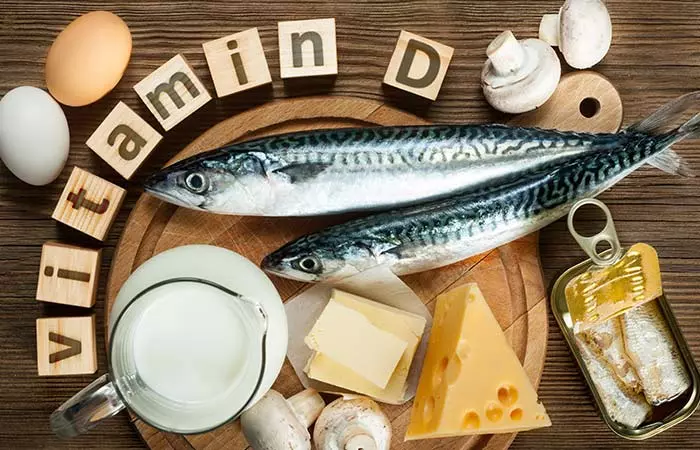
You Will Need
25-100 mcg of vitamin D
What You Have To Do
- Consume 25-100 mcg of vitamin D daily.
- You can either consume foods rich in vitamin D, like fatty fish, cheese, and eggs, or take additional supplements for it.
How Often You Should Do This
You can do this on a daily basis.
Why This Works
Vitamin D deficiency is associated with an increased risk of developing diverticulitis. Hence, maintaining optimal levels of serum vitamin D can also help you deal with the condition (4).
4. Licorice Root
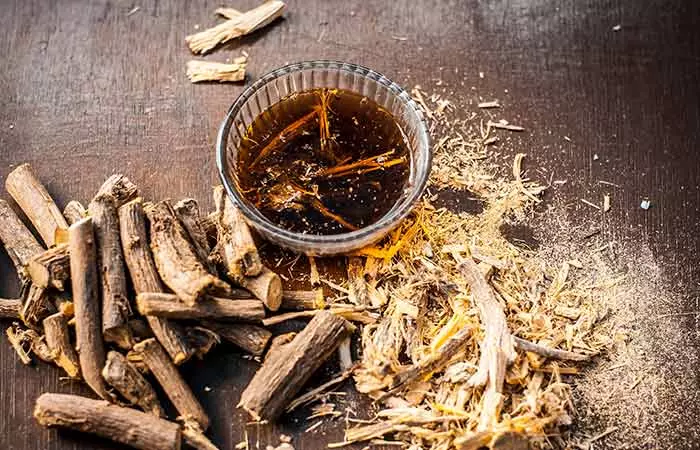
You Will Need
- 1-2 teaspoons of dried licorice root
- 1 cup of hot water
What You Have To Do
- Add one to two teaspoons of dried licorice to a cup of hot water.
- Steep for 5-10 minutes and strain.
- Drink the warm licorice tea.
How Often You Should Do This
You can drink licorice tea 1 to 2 times daily.
Why This Works
Licorice is widely used to treat spasms and inflammation, especially those of the gastrointestinal tracti The digestive passage leading from the mouth to the anus, containing all major organs of the digestive system. (5). Hence, it can definitely work wonders when it comes to soothing the inflamed diverticula.
5. Grapefruit Seed Extract
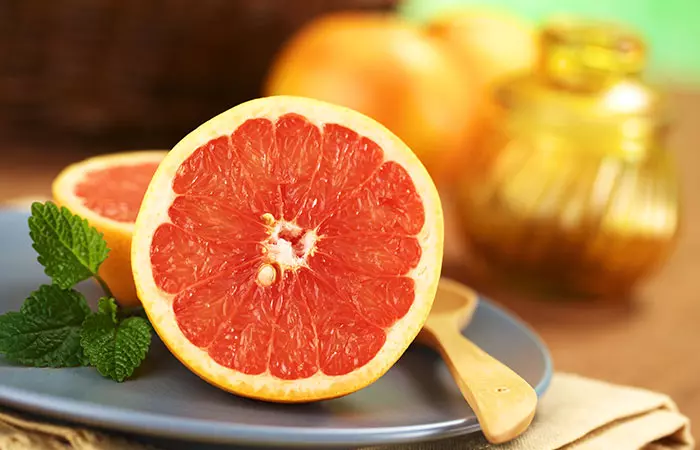
You Will Need
- 8-12 drops of standardized and chemical-free grapefruit seed extract
- 1 glass of water
What You Have To Do
- Add 8-12 drops of standardized and chemical-free grapefruit seed extract to a glass of water.
- Mix well and drink it up.
How Often You Should Do This
You may drink this mixture once daily.
Why This Works
Grapefruit seed extract is a powerful antibacterial agent that can help in treating infected diverticula (6).
6. Ginger
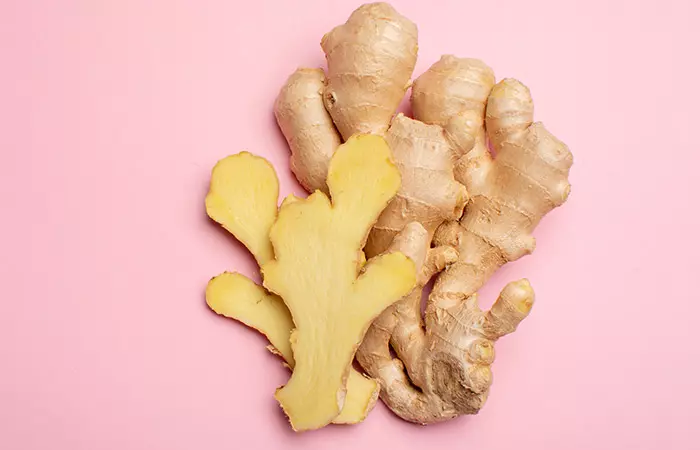
You Will Need
- 1-2 inches of sliced ginger root
- 1 cup of water
What You Have To Do
- Add 1-2 inches of sliced ginger to a cup of water.
- Bring it to a boil in a saucepan and simmer for 5 minutes.
- Strain and wait for the tea to cool a bit.
- Drink the warm ginger tea.
How Often You Should Do This
You can drink ginger tea 1-2 times daily.
Why This Works
The rich composition of ginger makes it a beneficial remedy in treating various medical conditions. Its anti-inflammatory properties can soothe an inflamed digestive tract and relax the muscles of the gut (7).
7. Garlic
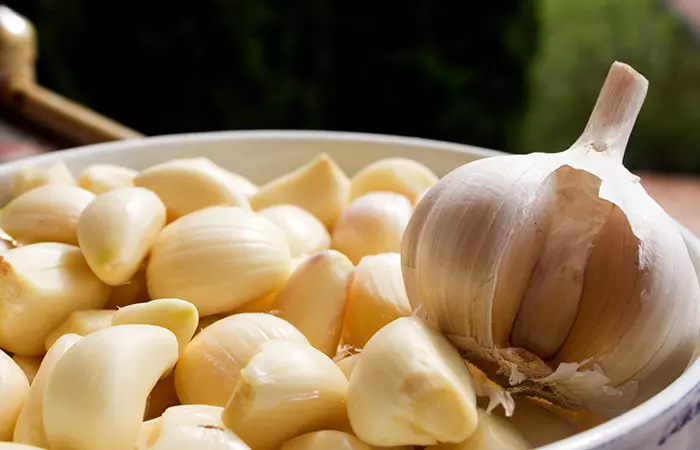
You Will Need
- 1 teaspoon of garlic juice
- Honey (optional)
What You Have To Do
- Extract a teaspoon of juice from a few garlic cloves.
- Consume the garlic extract.
How Often You Should Do This
You can do this once daily to combat diverticulitis.
Why This Works
Garlic possesses impressive anti-inflammatory and antimicrobial properties (8), (9). These activities might be helpful in treating diverticulitis and its symptoms.
 Quick Tip
Quick Tip8. Turmeric
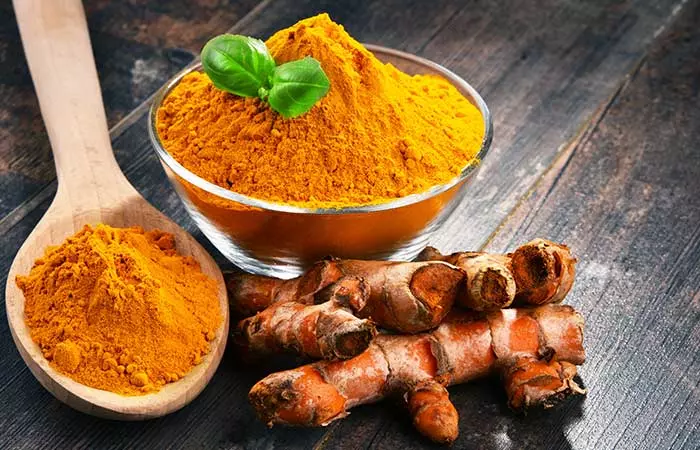
You Will Need
- 1 teaspoon of turmeric powder
- 1 glass of hot milk
What You Have To Do
- Add a teaspoon of turmeric powder to a glass of hot milk.
- Mix well and drink it up.
How Often You Should Do This
Do this at least once daily.
Why This Works
Curcumin, the active compound of turmeric, possesses powerful anti-inflammatory and antimicrobial properties (11), (12). These can help in reducing the inflammation and infection associated with diverticulitis.
9. Apple Cider Vinegar
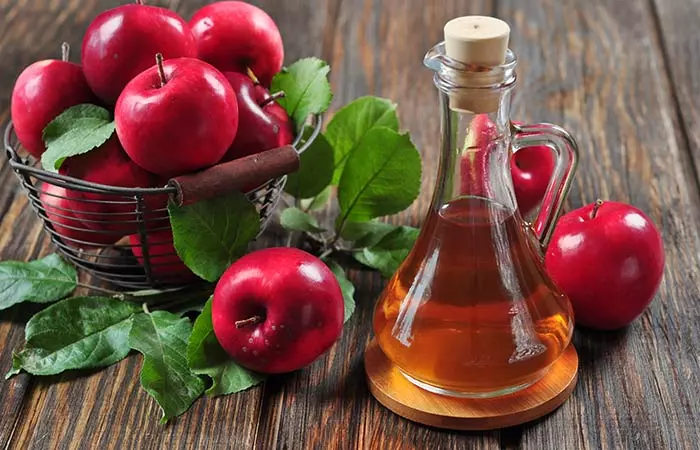
You Will Need
- 1-2 teaspoons of raw apple cider vinegar
- 1 glass of warm water
What You Have To Do
- Add one to two teaspoons of raw apple cider vinegar to a glass of warm water.
- Mix well and drink the mixture.
How Often You Should Do This
You can drink this concoction 1 to 2 times daily.
Why This Works
ACV has anti-inflammatory and antibacterial properties that can be helpful in the treatment of diverticulitis (13).
Gina, a Youtuber, who deals with diverticulitis tried taking apple cider vinegar to help manage it. She observed that this remedy works and helped her manage diverticulitis well. However, since she was taking ACV capsules she struggled with constipation. But her doctor prescribed a laxative powder that helped ease constipation and she shifted back to drinking ACV instead of taking capsules. She says, “That was 9 months ago, that I had my colonoscopy. I’ve had two little bouts of an attack in those 9 months. I was able, both times, to fix it with a drink of my apple cider vinegar, to get things going, or whatever, clear my guts out. And that fixed both attacks (i).”
These remedies will help in managing the symptoms of diverticulitis and lessen the pain. Apart from these, some individuals also consider acupuncture to help ease diverticulitis symptoms. But how effective is it?
Acupuncture For Diverticulitis
Acupuncture is an ancient Chinese therapy involving the insertion of thin needles into certain points on the body. It is sometimes considered a complementary approach for managing diverticulitis symptoms. Acupuncture is believed to stimulate the body’s natural healing processes. This may boost blood circulation, reduce inflammation, and enhance the overall functioning of the digestive system. But there are limited studies to support these claims.
Many individuals may find relief from diverticulitis symptoms like abdominal pain through regular acupuncture sessions, especially when they are done in conjunction with other medical treatments and dietary changes (14).
It’s crucial to approach acupuncture as an additional therapy alongside conventional medical treatments. Individuals considering acupuncture for diverticulitis should consult their healthcare providers to ensure it is safe and appropriate for them. Also, always seek acupuncture treatment from qualified practitioners.
You must also pay attention to your diet as it has a major role to play in your recovery from diverticulitis.
How Does Your Diet Affect Diverticulitis?
A diverticulitis diet is usually a temporary measure that gives your digestive system some care and rest. Oral intake of eatables is usually reduced until the symptoms of bleeding and diarrhea subside.
Your doctor might prescribe you a holistic clear liquid diet that includes the following.
Foods To Eat
- Fruit juices without pulp
- Broths and soups
- Ice chips
- Ice popsicles without fruit pulps
- Water
- Gelatin
- Tea
- Coffee without cream
Once your symptoms start improving, your doctor may ask you to begin intake of low-fiber foods with nutrition gradually.
They include:
- Peeled fruits without seeds that are cooked or canned
- Canned or cooked peeled vegetables such as carrots, potatoes, and beans
- Poultry
- Fish
- Eggs
- Fruit and vegetable juices (without pulp)
- Low fiber cereals
- Dairy products like milk, cheese, and yogurt
- White rice, pasta, and noodles
You also need to restrict your intake of certain foods if you are suffering from diverticulitis. These are foods that are difficult to digest.
Foods To Avoid
- Nuts
- Corn
- Popcorn
- Seeds
By now, you must have understood that one of the best ways to prevent diverticulitis from worsening is hydration and modification of your diet and lifestyle. You can say, a well-managed diverticulitis diet is crucial for recovery. Listed below are a few additional wellness tips that can prevent the recurrence of diverticulitis.
Prevention Tips
- Increase your intake of fiber-rich foods gradually once your symptoms begin improving.
- Drink a lot of fluids.
- Avoid consuming refined foods like white rice, white pasta, etc.
- Avoid getting constipated. Using over-the-counter laxativesi Drugs or medicines that help loosen up stool and relieve constipation. or stool softeners may help.
- Exercise regularly.
- Quit smoking.
- Manage your weight.
- Explore relaxation techniques such as meditation, deep breathing exercises, or spending time in nature.
- Aim for 7-9 hours of uninterrupted sleep each night.
- Pay attention to your body’s signals and avoid activities that trigger pain or discomfort.
Infographic: Top Home Remedies To Ease Diverticulitis Pain
Diverticulitis requires medical intervention for effective treatment. However, you can manage some of its debilitating symptoms at home by self-help and keeping a close eye on your diet and consuming a few soothing ingredients.
Check out the infographic below to learn more about the home therapy you can follow to ease some of the symptoms of this condition. Illustration: StyleCraze Design Team
Diverticulitis is characterized by inflammation in the pouches of the digestive tract. It causes extreme discomfort and requires immediate medical intervention. Abdominal pain, nausea, vomiting, fever, and diarrhea are the traditional symptoms of this condition. However, in addition to medication, you can also manage the symptoms with some natural remedies. Slippery elm, herbal aloe vera juice, vitamin D, licorice root, and grape seed extracts are some effective remedies for treating diverticulitis. Consult your doctor before using any of these home remedies.
Frequently Asked Questions
When to see a doctor for diverticulitis?
If you feel that you are exhibiting any of the symptoms associated with diverticulitis, see a doctor and avail medical treatment immediately.
What does the pain that surfaces diverticulitis feel like?
The symptoms of diverticulitis can last anywhere from a few hours to days. Its most prominent symptom is severe pain (cramp) that is often felt on the lower left side of the abdomen.
How long does diverticulitis pain last?
The symptoms of diverticulitis, such as pain and cramps that occur in the lower left quadrant of the abdomen, can last for hours or even days.
Does diverticulitis cause diarrhea?
The inflammation of the diverticula that forms along the digestive tract can cause many symptoms and hardly subsides completely. This inflammation can cause constipation, diarrhea, bloating, abdominal pain, and bloating.
Are bananas good for diverticulitis?
Possibly. Bananas are rich in fiber and potassium that are thought to aid in recovery. However, more information is needed in this regard.
Does drinking water help diverticulitis?
Yes, drinking water can help with diverticulitis and also prevent constipation.
What happens if you let diverticulitis go untreated?
Diverticulitis, if left untreated, may cause severe pain and accumulation of pus (also called an abscess) outside the colon wall. It may even cause a generalized infection in the lining of the abdominal cavity.
Can diverticulitis be caused by stress?
Yes, environmental stress plays a role in the development of diverticulitis. Even stress on the digestive system, caused due to low-fiber or high-fat diets, can cause diverticulitis.
What tea is best for diverticulitis?
Green tea is best for diverticulitis as it has anti-inflammatory, anti-bacterial, and antiviral properties that may reduce inflammation and slow down the associated infection.
Key Takeaways
- Diverticulitis causes infectious pouches along the digestive tract.
- Common symptoms of this disease are stomach pain, vomiting, bleeding, and diarrhea.
- Elderly people and people with sedentary lifestyles are more prone to this disease.
- Aloe vera juice and grape seed extracts may ease the pain.
- Drinking a lot of fluids and avoiding refined foods may prevent diverticulitis.
Illustration: Diverticulitis: 10 Home Remedies And Natural Treatments
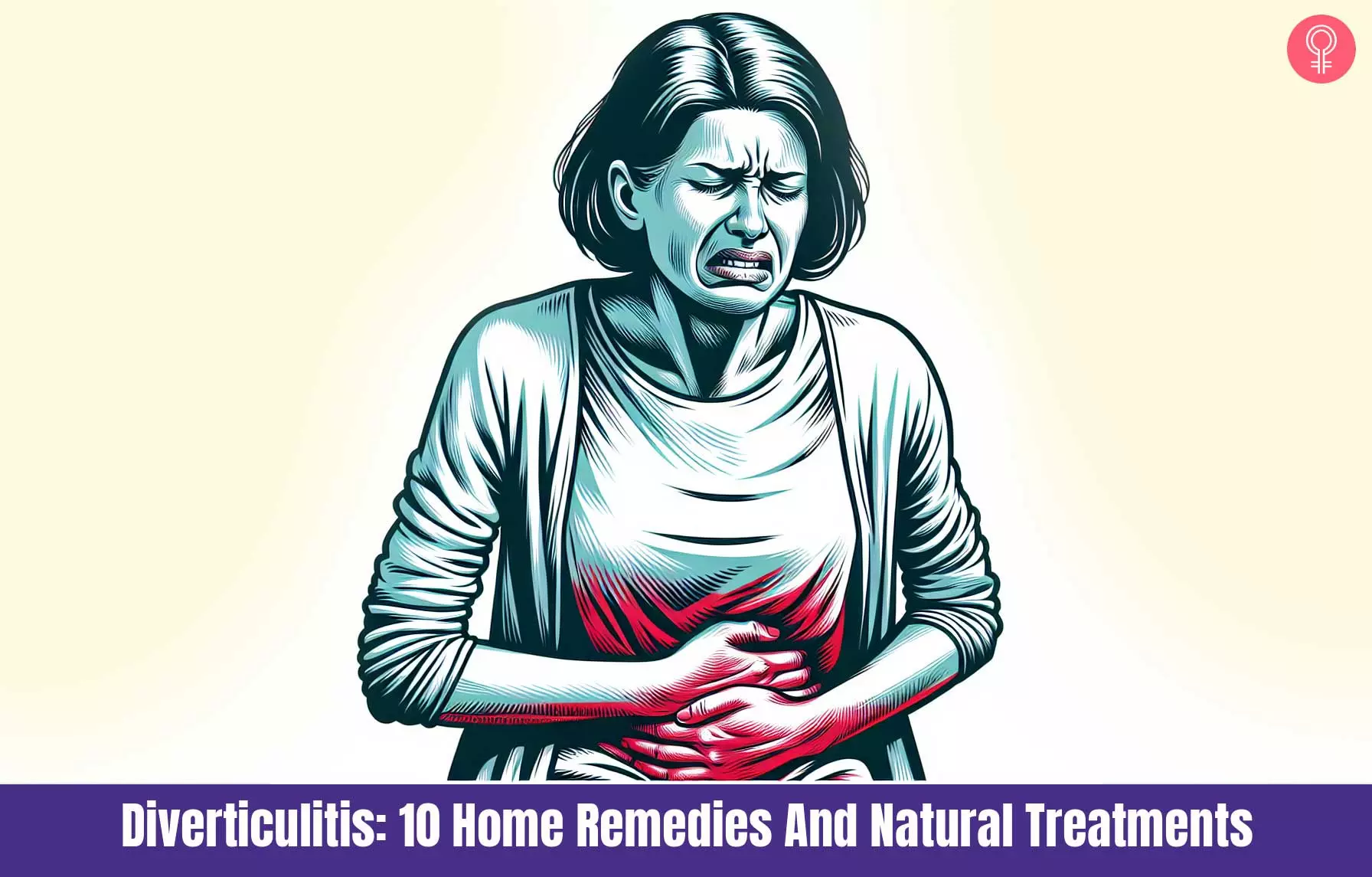
Image: Dall·E/StyleCraze Design Team
Worried about diverticulitis? Want to know how to reduce the risk? Discover essential factors to avoid and practical tips in this insightful video. Watch now!
Personal Experience: Source
StyleCraze's articles are interwoven with authentic personal narratives that provide depth and resonance to our content. Below are the sources of the personal accounts referenced in this article.
i. Diverticulitis? You NEED To Watch This!https://www.youtube.com/watch?v=3qFoChNJ4QY
References
Articles on StyleCraze are backed by verified information from peer-reviewed and academic research papers, reputed organizations, research institutions, and medical associations to ensure accuracy and relevance. Read our editorial policy to learn more.
- “Diverticular disease: Epidemiology and management” Canadian Journal Of Gastroenterology, US National Library of Medicine
- “Prebiotic Potential of Herbal Medicines Used in Digestive Health and Disease” Journal Of Alternative and Complementary Medicine, I US National Library of Medicine
- “Antiinflammatory activity of extracts from Aloe vera gel” Journal of Ethnopharmacology, US National Library of Medicine
- “Higher Serum Levels of Vitamin D are Associated with Reduced Risk of Diverticulitis” Clinical Gastroenterology and Hepatology, US National Library of Medicine
- “The anti-inflammatory activity of licorice, a widely used Chinese herb” Pharmaceutical Biology, US National Library of Medicine
- “The effectiveness of processed grapefruit-seed extract as an antibacterial agent: I. An in vitro agar assay” Journal of Alternative and Complementary Medicine, US National Library of Medicine
- “Anti-Oxidative and Anti-Inflammatory Effects of Ginger in Health and Physical Activity: Review of Current Evidence” International Journal of Preventive Medicine, US National Library of Medicine
- “Immunomodulation and Anti-Inflammatory Effects of Garlic Compounds” Journal of Immunology Research, US National Library of Medicine
- “Antimicrobial activity of fresh garlic juice: An in vitro study” Ayu, US National Library of Medicine
- “New Strategies For The Management Of Diverticular Disease: Insights For The Clinician” Therapeutic Advances In Gastroenterology. US National Library Of Medicine
- “Anti-inflammatory properties of curcumin, a major constituent of Curcuma longa: a review of preclinical and clinical research” Alternative Medicine Review, US National Library of Medicine
- “A Review on Antibacterial, Antiviral, and Antifungal Activity of Curcumin” BioMed Research International, US National Library of Medicine
- “Antimicrobial activity of apple cider vinegar against Escherichia coli, Staphylococcus aureus and Candida albicans; downregulating cytokine and microbial protein expression” Scientific Reports, US National Library of Medicine
- “Efficacy of Acupuncture in the Treatment of Chronic Abdominal Pain” Anesthesia and Pain Medicine, US National Library of Medicine
Read full bio of Joel Kahn
Read full bio of Shaheen Naser
Read full bio of Arshiya Syeda
Read full bio of Dipti Sharma





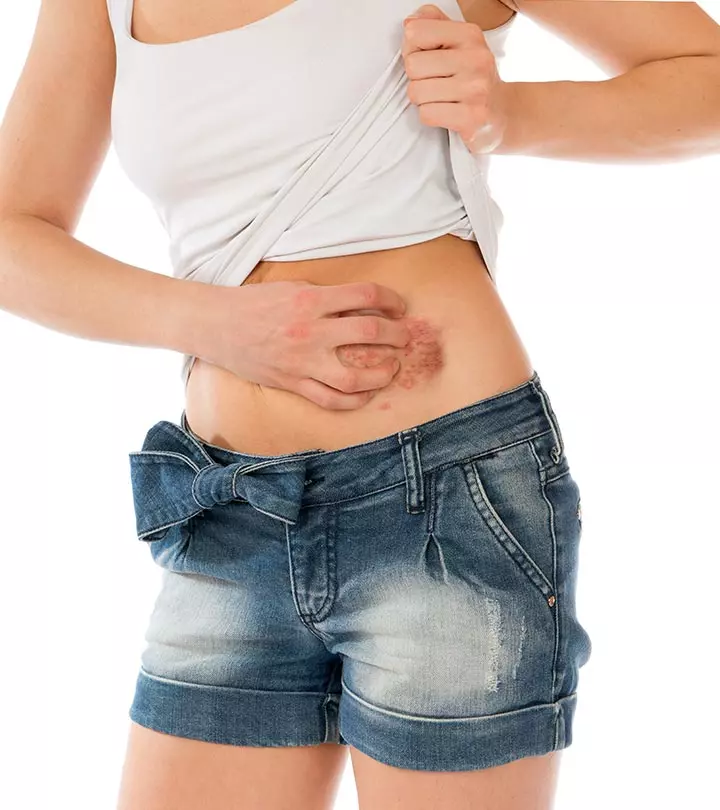
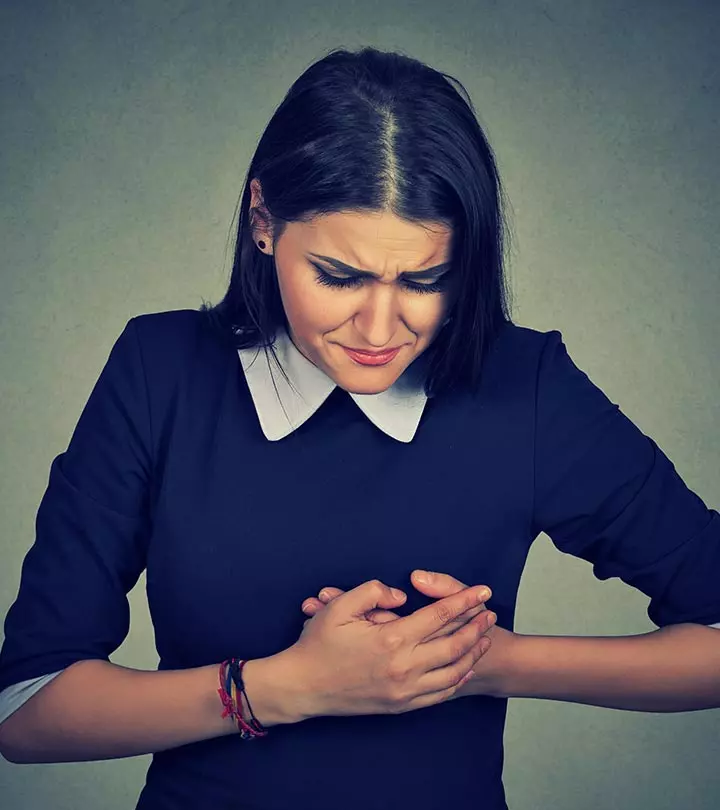
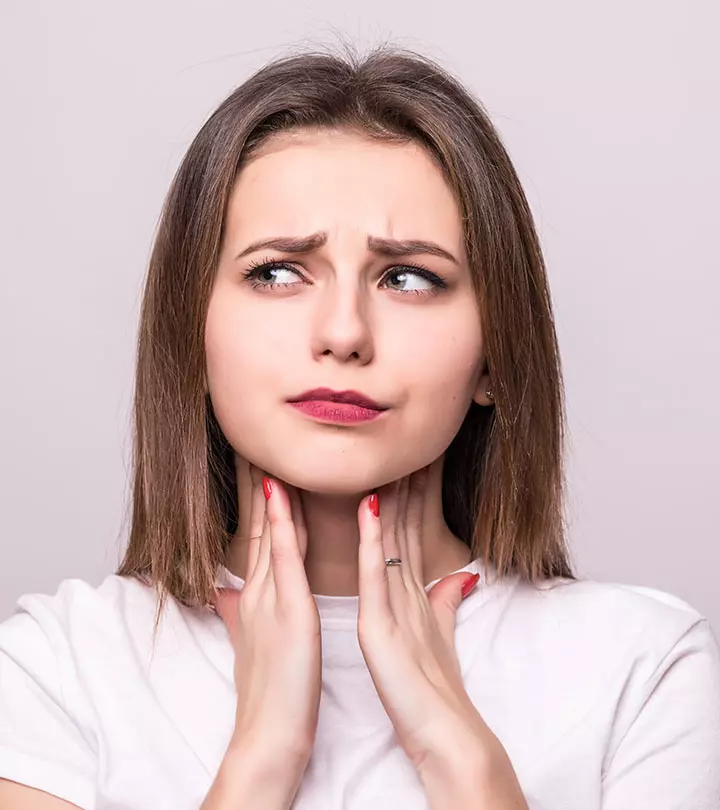
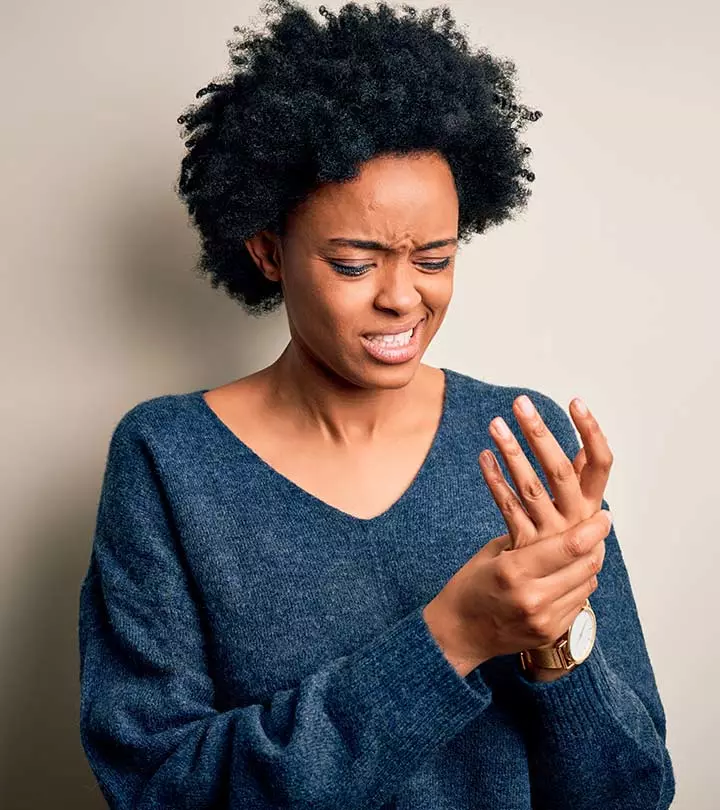

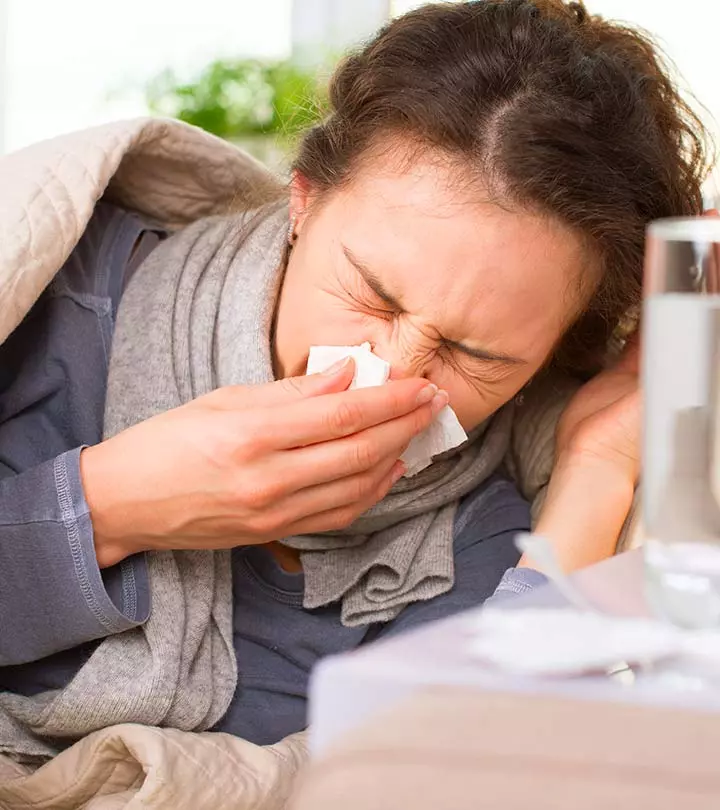
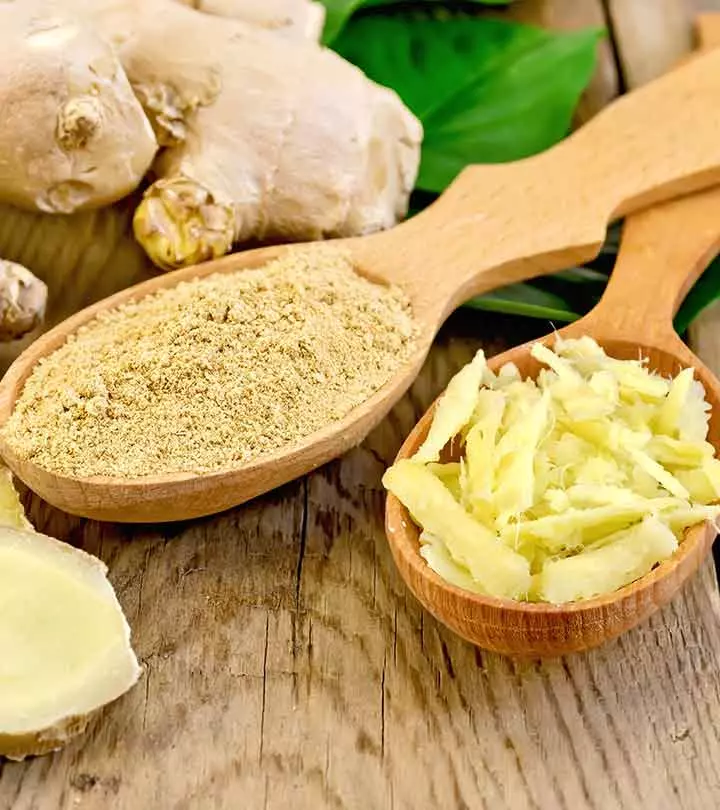
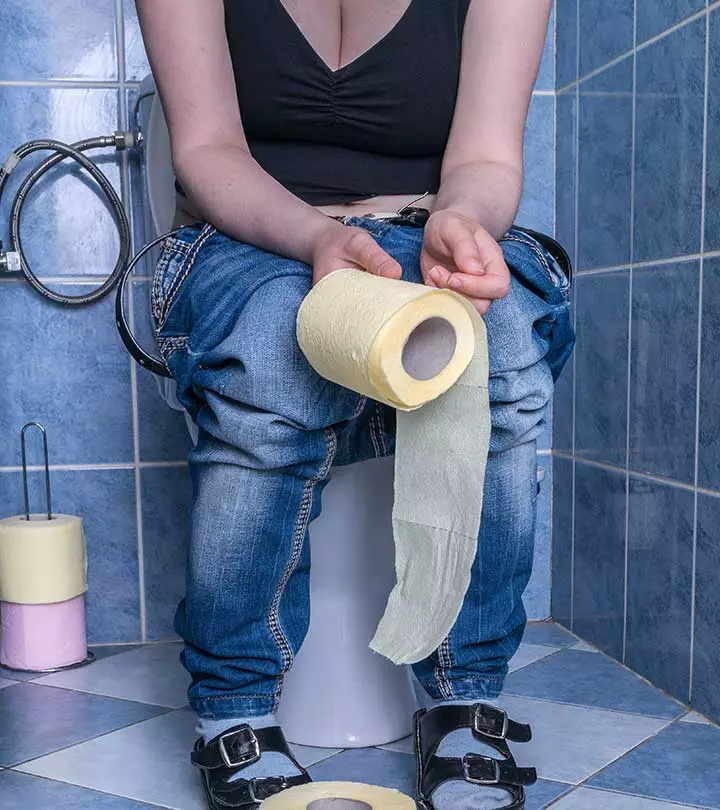

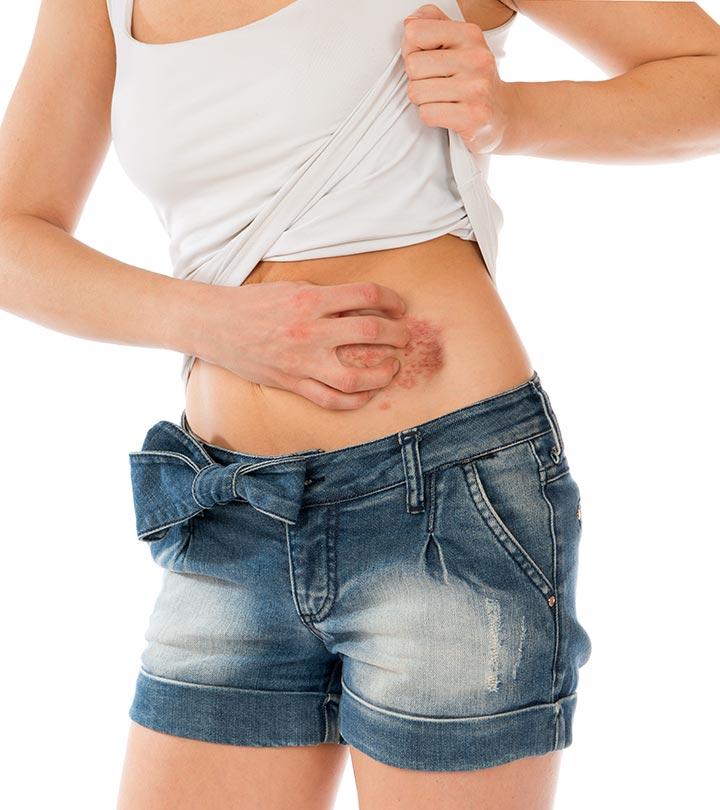

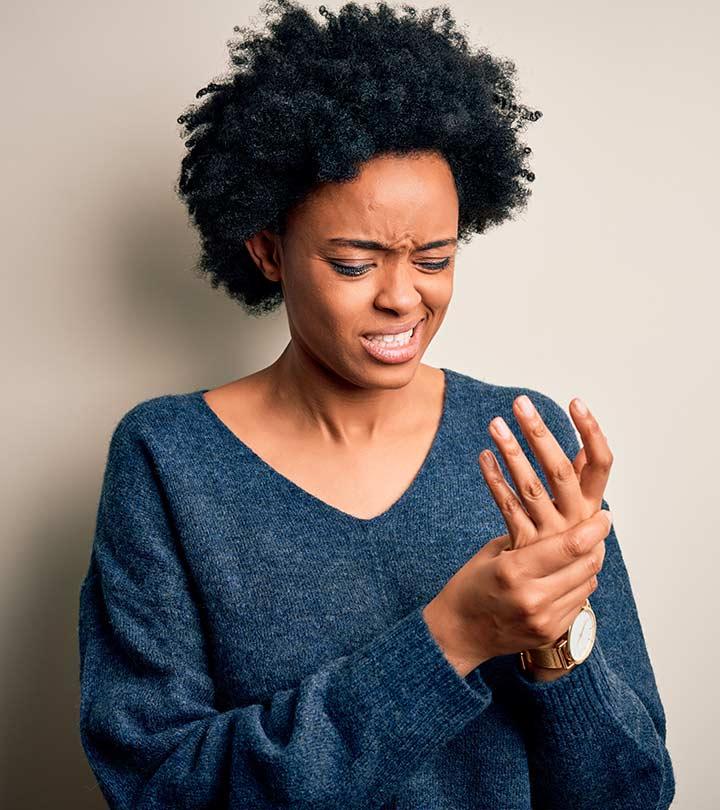
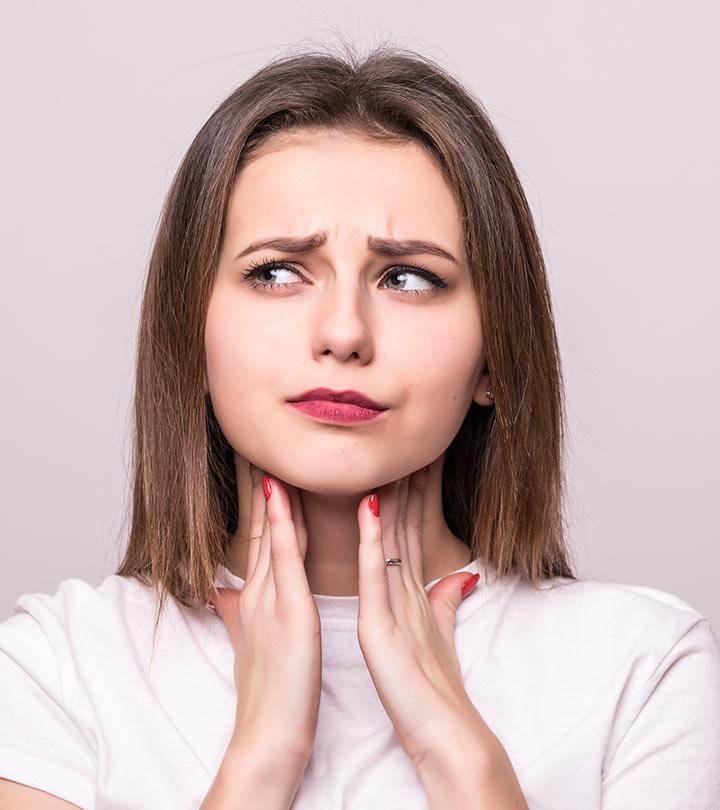
Community Experiences
Join the conversation and become a part of our empowering community! Share your stories, experiences, and insights to connect with other beauty, lifestyle, and health enthusiasts.